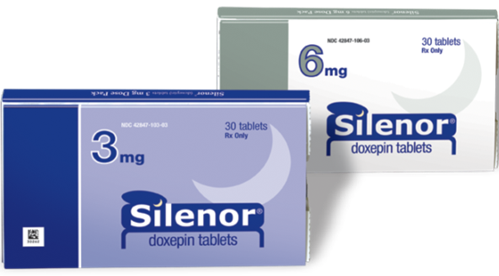 New Health Guide
New Health Guide
Silenor is a new, low dose drug used to treat those suffering with insomnia (trouble sleeping). The active ingredient in Silenor is doxepin (a tricyclic antidepressant), usually used to treat anxiety, Silenor utilizes doxepin for sleep therapy and maintenance. Exactly how the medication exerts its effects on a person's ability to sleep is unknown, but it is theorized to be through the simulation of histamine H1 receptors.
If you have any known allergies to doxepin, or any other anti-depressants, the use of Silenor would be ill-advised. The same is true if you have untreated narrow-angle glaucoma or urination problems. Do not take Silenor if you have used an MAO inhibitor in the past two weeks. There are many MAO inhibitors, including isocarboxazid, linezolid, phenelzine, among others. Ensure you have not consumed these or any other MAO inhibitors before taking Silenor, or a dangerous drug interaction could occur.
To ensure Silenor is the correct course of action for you to battle your inability to sleep, consult a doctor before use. You should always consult a health care professional if you suffer from sleep apnea, kidney or liver disease, or a history of depression/mental illness. As doxepin can affect blood sugar levels, those with diabetes should also prioritize meeting with a health care professional before consumption, as should those who are pregnant, as the effect of Silenor on unborn babies is unknown. Doxepin can be passed into breast milk, so mothers who are breast feeding should avoid using Silenor before consulting a doctor, and the medicine should not be given to a child without prior medical advice.

It is important to read all relevant information relating to doxepin before you take Silenor. You should never exceed the recommended dose, and consult your doctor or pharmacist if you have any questions.
Silenor is applied orally, once a night, 30 minutes before bedtime. It is imperative to ensure that you are able to sleep 7-8 hours of uninterrupted rest before you have to carry out physical activity.
It is also important to consume Silenor on an empty stomach; consumption within 3 hours of a meal will delay the effect of the medication.
To achieve the best results, use the medication on a regular basis, but ensure to consult a health care professional after each course of treatment to ensure no adverse side effects have occurred. Tell your doctor if your condition has not improved or has gotten worse after 7-10 days.
Using doxepin for sleep therapy and maintenance can be highly beneficial to ease your condition, but there are some side effects to note, (if you experience any of these, ensure to consult a health care professional immediately).
Some serious side effects are a fast or uneven heart rate, confusion, hallucinations, convulsions, new or worsening signs of depression (anxiety, feeling of agitation, suicidal thoughts), easy bruising, light headedness or fainting, twitches in your eye, tongue, neck, or jaw, uncontrollable shaking, less frequent urination (or none at all), extreme thirst, headache, sickness, and weakness.
Other Silenor side effects include, but are not limited to, drowsiness, dizziness, dry mouth, loss of appetite, blurred vision, and increased sweating. Please consult your doctor for a full list of Silenor side effects.